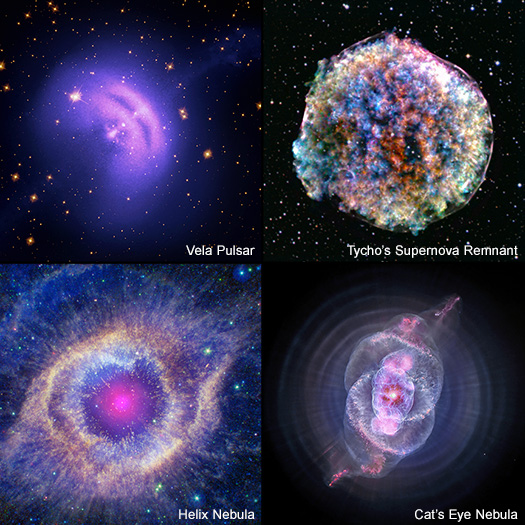Release of 3D-Rendered Chandra X-ray Observatory Data Kicks Off the Smithsonian's "Cosmic Journey"
For Release: April 18, 2024
Smithsonian/SAO/CXC

Credit: Vela Pulsar: X-ray: NASA/CXC/SAO; Optical: NASA/ESA/STScI; Image processing: NASA/CXC/SAO/J. Schmidt, K. Arcand; Tycho's Supernova Remnant: X-ray: NASA/CXC/SAO; Optical: DSS; Image Processing: NASA/CXC/SAO/N. Wolk; Helix Nebula: X-ray: NASA/CXC/SAO; UV: NASA/JPL-Caltech/SSC; Optical: NASA/ STScI/M. Meixner, ESA/NRAO/T.A. Rector; Infrared:NASA/JPL-Caltech/K. Su; Image Processing: NASA/CXC/SAO/N. Wolk and K. Arcand; Cat's Eye Nebula: X-ray: NASA/CXC/SAO; Optical: NASA/ESA/STScI; Image Processing: NASA/CXC/SAO/J. Major, L. Frattare, K. Arcand
Images, Captions, and Videos
The Smithsonian has created interactive Instagram experiences using 3D models of celestial objects generated from data collected by the Chandra X-ray Observatory and other telescopes. Through augmented reality, users will be able to view and immerse themselves in nebulae, exploded stars and more through their phone cameras while listening to the data transformed into sound—or data sonifications. The images will be accompanied by informative text that explains what users are looking at. The effects will be free and available on Instagram for at least six months, and some will remain viewable in perpetuity on the Smithsonian’s website.
The Chandra X-ray Observatory is the most powerful X-ray telescope in the world. It observes the lifecycles of stars and galaxies, detecting nebulae, supernovae, black holes and other objects in space.
“We are excited to bring data from the universe down to Earth in this way,” said Kimberly Arcand, Chandra’s visualization and emerging technology scientist at the Smithsonian Astrophysical Observatory and a member of the Center for Astrophysics | Harvard & Smithsonian. “By enabling people to access cosmic data on their phones and through AR, it brings Chandra’s amazing discoveries literally right to your fingertips.”
In addition to Instagram, some of these new 3D renderings of celestial objects have joined the Smithsonian’s collection of 3D digital objects, making the observatory’s data permanently accessible to everyone in their homes and classrooms. Further, the data sonification extends an accessibility project that the Chandra team has led since 2020.
“These effects, created using NASA data collected by Smithsonian scientists, and the informative content produced by our communications and public engagement teams, demonstrates the power of the Smithsonian to inspire,” said Ellen Stofan, Under Secretary for Science and Research at the Smithsonian. “These data provide a unique educational opportunity for both adults and children all around the world who have an interest in what’s going on beyond our view of the night sky.”
The objects in the new Chandra Instagram filter collection include the Tycho Supernova Remnant, the Vela Pulsar, the Helix Nebula, the Cat’s Eye Nebula and the Chandra spacecraft. The 3D models of the first three objects were done in conjunction with Sal Orlando, an astrophysicist at Italy’s National Institute for Astrophysics in Palermo. The Cat’s Eye Nebula was created with data from Ryan Clairmont, physics researcher and undergraduate at Stanford University. Arcand worked with Brown University’s Tom Sgouros and his team, research assistant Alexander Dupuis and undergraduate Healey Koch, on the Chandra Instagram filters.
These new effects were released to celebrate the 25th anniversary of Chandra, NASA’s flagship X-ray telescope that has been operated by the Smithsonian Astrophysical Observatory since the telescope launched aboard Space Shuttle Columbia in 1999. They also kick off the Smithsonian’s Cosmic Journey, an experience of artistic, cultural and scientific events, collaborations and content designed to spark curiosity and inspire learning among a diverse range of communities who share a budding fascination with space. This national campaign uniquely blends science with education, visual art, music, history and culture, opening multiple entry points for people to find their connection with the cosmos.
About Cosmic Journey
With its Cosmic Journey 2024 campaign, the Smithsonian is harnessing its vast scientific and educational resources to spark curiosity and wonder about the universe. It unites hundreds of scientists, curators, artists, and educators from the Smithsonian Astrophysical Observatory, the largest astrophysical research organization in the world; the National Air and Space Museum; the Smithsonian’s many art and culture museums, libraries, and archives; and partners and collaborators worldwide. Cosmic Journey crafts and presents a diverse array of visual art, music, and cultural programing, accessible in person and online. It exemplifies the Smithsonian’s unparalleled ability to blend history, science, art and culture to celebrate the marvels of the cosmos and life on Earth, and it inspires a collective commitment toward fostering a sustainable future for our precious planet. For more information, visit si.edu/cosmicjourney. Follow the conversation on social media with the hashtag #CosmicJourney.
Media Contact:
Megan Watzke
Chandra X-ray Center, Cambridge, Massachusetts
617-496-7998
mwatzke@cfa.harvard.edu
Benjamin Marcus
Smithsonian Institution, Washington, D.C.
202-633-5194
marcusba@si.edu


